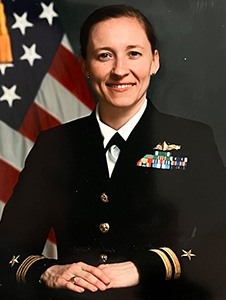Cathryn Hunt ’15
“Middlebury taught me how to think critically, how to synthesize information, and problem solve. Thanks to these invaluable skills, I’ve excelled in these roles just as much as my peers with engineering degrees or commercial mariner backgrounds.”

Why did you decide to pursue national service and the military?
My father attended the U.S. Naval Academy. Growing up, he often spoke about the rapid personal growth he experienced at the Naval Academy. After graduating Middlebury, I felt a need to get outside my comfort zone. I decided that being pushed to my physical and mental limits was the best way to understand myself, my strengths and weaknesses, and who I wanted to become. I joined the military—the Navy specifically, because of my Dad—because I could achieve these personal goals while simultaneously serving my country. It seemed like a win-win.
How did your Middlebury liberal arts education factor into the mindset, perspectives, approach you took to your military service?
In the Navy, I’m constantly in roles outside of my “educational” wheelhouse. This includes driving a warship through the most congested shipping lanes in the world, managing a warship’s engineering plant, and hunting submarines. On the surface, it seems like my liberal arts education from Middlebury (I’m a geography major) wouldn’t prepare me for these experiences. Yet Middlebury taught me how to think critically, how to synthesize information, and problem solve. Thanks to these invaluable skills, I’ve excelled in these roles just as much as my peers with engineering degrees or commercial mariner backgrounds.
Middlebury has an ethic of service to a community. What do you want to tell others about serving your community or your country through military service?
Military service isn’t just about defending America through combat or power projection abroad. It’s also about serving those you lead. As a division officer, I was in charge of 10–20 enlisted service members at a time. Members of the military come from all socioeconomic backgrounds, all walks of life, all levels of education. This meant understanding a variety of viewpoints, connecting with people I would’ve likely not encountered outside the military, and empathizing with experiences very different from my own. For me, military service is also about positively impacting those you lead in ways that extend well beyond just their duties in the military.
Is there anything else you would like to share about your experience as a service member or veteran at Middlebury or MIIS?
There’s a misconception that to serve in the military, you need to agree with everything the military does. To me, serving has nothing to do with endorsing or not endorsing the military’s actions. Instead, I believe it’s about understanding. Understanding what it’s like to be on the front lines, understanding how foreign policy is shaped at the operational level, or even understanding how the defense budget is spent. This firsthand experience is invaluable for anyone going into a profession that touches on any of these aspects.

